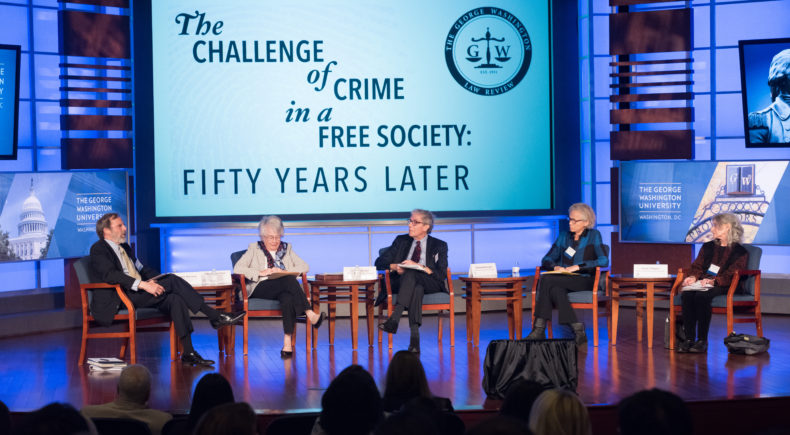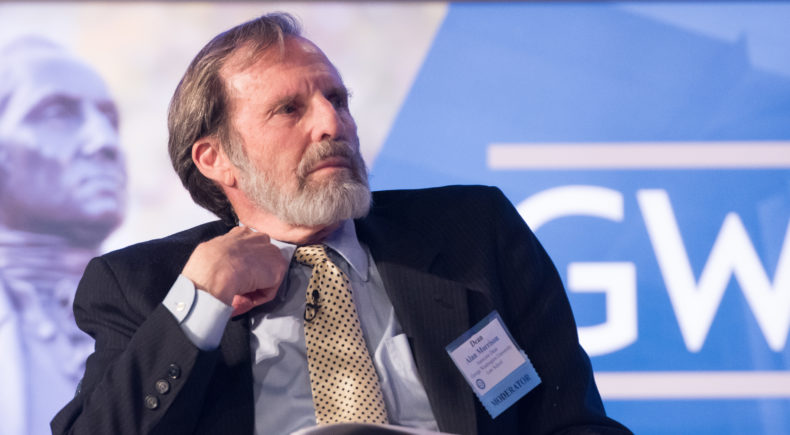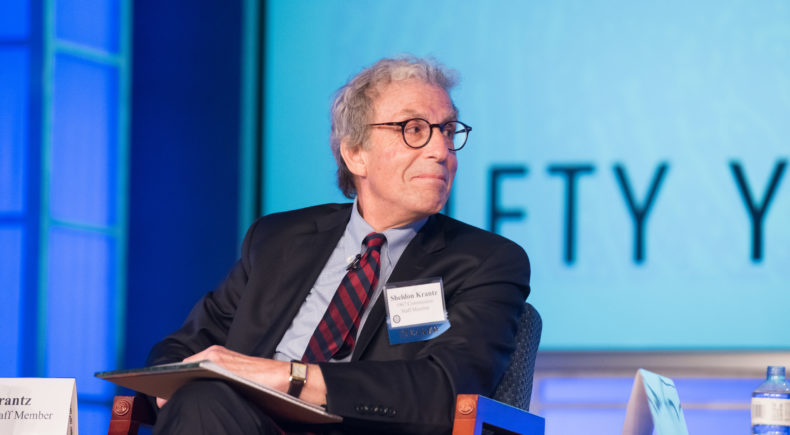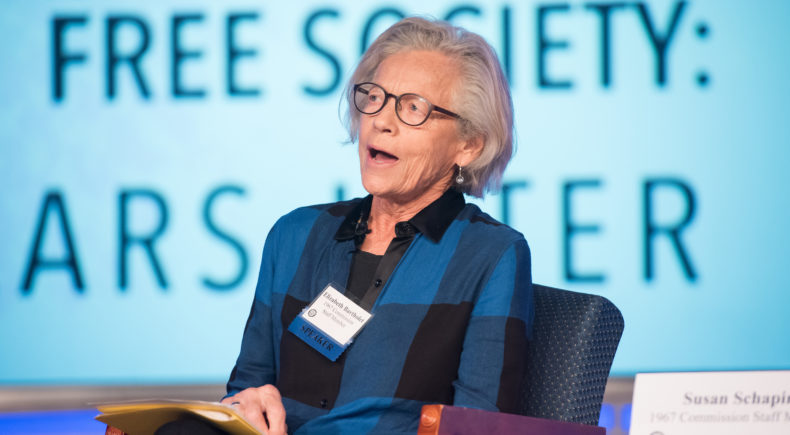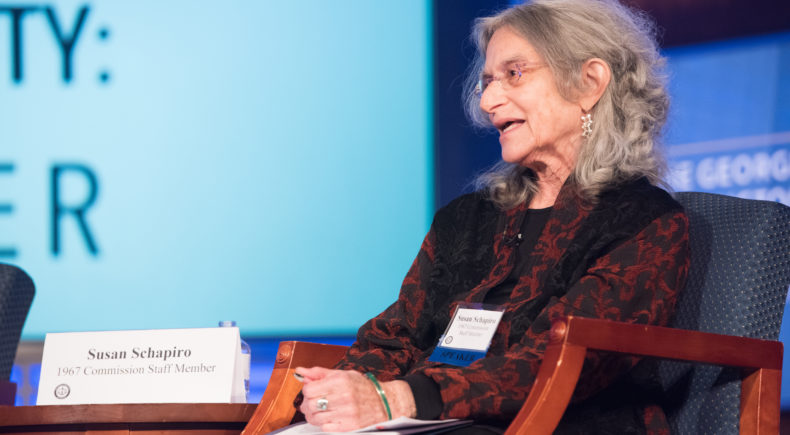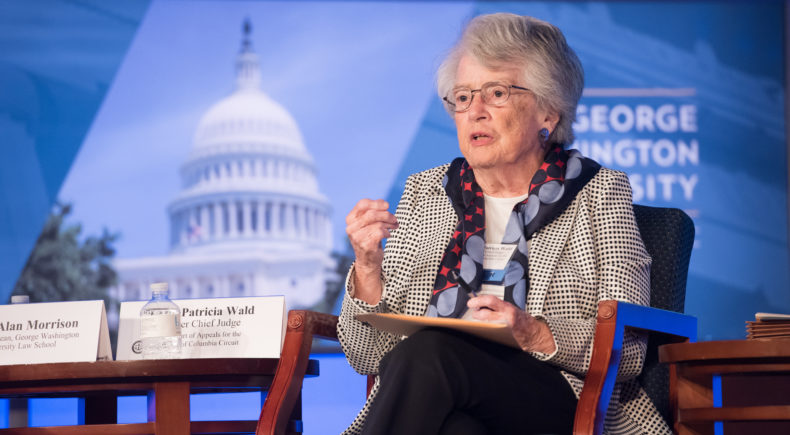Symposium 2017 | Experiences and Perspectives on the 1967 President’s Commission on Law Enforcement and Administration of Justice
The Symposium’s opening panel, composed of members who served with the 1967 President’s Commission on Law Enforcement and the Administration of Justice, addressed their experiences, perspectives, and thoughts on the history, development, and future of criminal justice reform. Dean Alan Morrison, the Lerner Family Associate Dean for Public Interest and Public Service Law at The George Washington University Law School, moderated the panel.
The first speaker was Elizabeth Bartholet, Professor of Law, Faculty Director of the Child Advocacy Program at Harvard Law School, and 1967 Commission Staff Member. Looking back on the Commission’s goals, Professor Bartholet observed that criminal justice is far from, and in some respects, quite the opposite of, where she thought the Commission recommendations would lead. She will not give up, though. Professor Bartholet gives this advice to her law students: it is far better to challenge injustice than to do nothing about it. Despite recognizing that her expectations on how quickly and substantially criminal justice reform could be implemented had been tamed, she argues unequivocally that it is a goal worth pursuing.
The progressive values and mentality that characterized much of the 1960s informed the Commission and its Report. Professor Bartholet stressed that a common thread ran though the Commission’s thinking: rationality. If rational thought could be applied to problems in the criminal justice system, then the system could ultimately be improved. In addition to rationality, the Commission was grounded in a belief that the criminal justice system could be humane. This mentality included showing humanity to those who are perpetrators of crime, as they are often victims of conditions in which crime can be a consequence. Professor Bartholet stressed that it is in the interest of society to give every person an opportunity to be a successful member of society; that is how, going forward, crime can be reduced, and the system can be reformed.
The second speaker was Sheldon Krantz, Visiting Professor of Law at Georgetown University Law Center and 1967 Commission Staff Member. Professor Krantz began by reflecting on the messages that the Commission received from the Johnson Administration, which subsequently informed their thinking and approaches. Turning to the Commission’s recommendations to improve policing, Professor Krantz argued that policing has dramatically improved since the Commission’s Report. He recognized arguments that maybe society has gone too far in some respects (e.g., equipping police with unneeded equipment), but asserted that when examined holistically, policing is an area where the criminal justice system has improved since the Commission’s Report.
Professor Krantz then turned to topics he thought the Commission failed to properly address. The Commission focused primarily on stranger-to-stranger crime, leaving interfamily crime and female interaction with the criminal justice system “strangely absent” from the Report. The implication was clear: going forward, time and attention must be given to these subjects.
The third speaker was Susan Schapiro, 1967 Commission Staff Member. Ms. Schapiro began with a personal anecdote. She noted that her service with the Commission started after receiving a call while working in the Office of Criminal Justice in the Deputy Attorney General’s Office. Next, echoing Professor Krantz, she observed that the gender composition of the panel was simply not reflective of the Commission’s landscape. Ms. Schapiro, however, stated that there was a feeling of collegiality at the Commission and she felt comfortable working there. Ms. Schapiro concluded by stressing that working on criminal justice reform requires staying power. The work is extensive and difficult, but extremely important.
The fourth speaker was Judge Patricia Wald, former Chief Judge of the U.S. Court of Appeals for the District of Columbia Circuit and former Commissioner of the President’s Commission on Crime in the District of Columbia and Advisor to the 1967 Commission. Judge Wald first reflected on crime in the District of Columbia and the reasons for a D.C. Crime Commission. With a reputation as a world crime capital, and it being somewhat representative of crime in the country, President Johnson believed it was necessary.
Despite the division and unrest in the United States at the time of the Commission, Judge Wald stressed that there was a pervasive belief and optimism that the Commission could do something about the problems facing the nation and make a positive impact. Again, those who worked with the Commission believed that the power of reason could triumph, and that it could be harnessed to develop solutions.
Judge Wald then addressed some issues that the Commission might not have fully understood or dealt with. She indicated that the Commission may not have had a full grasp on the insidiousness of racial stereotypes and discrimination that pervade criminal justice institutions. Understanding the role that race plays in the availability of opportunities for individuals and communities is a most salient consideration for the future of criminal justice reform. Ultimately, Judge Wald emphasized that we must provide opportunities for all Americans in order to reduce crime.
Dean Alan Morrison then shifted the conversation to broad recommendations. Noting that there was nothing more central to the Commission’s Report, Ms. Shapiro stated that an emphasis on prevention is fundamental to successful criminal justice reform. She reiterated that ensuring opportunity for full participation in society is the basic and necessary means of prevention and progress. Professor Krantz then spoke about the changes in policing. He asserted that there has been substantial progress made in policing in the 50 years since the Report was published. Judge Wald then spoke about the need for alternatives to provide more effective treatment and stated that many of the reform recommendations from the Commission have played out in limited model projects, but have not yet changed the field. Moving forward, Judge Wald suggested that society must employ evidence-based policies and that states must participate in reform efforts and work to adopt alternatives. Speaking about collateral consequences of incarceration, Professor Bartholet noted that while there have been some improvements in the number and severity of collateral consequences since the Commission, the increase in incarceration rates outweighs these limited legal protections simply because significantly more people face incarceration and subsequent collateral consequences.
Finally, Dean Alan Morrison posed a hypothetical: if there were a proposal in Congress for a new Commission, would you say this would be a good or bad idea, and what advice would you give to the new Commission? Believing the impetus for a new commission must come from a genuine desire to improve conditions, Ms. Schapiro stated that there would need to be a clear understanding of what we want to accomplish and why. Professor Bartholet stated that whether it is a good or bad idea depends on who appoints the commission and what their motivation is. As to whether a new commission would be a good idea, Professor Krantz contended that Congress should have nothing to do with it. A major positive of the 1967 Commission was that it was impartial and focused on merits, not political ideology. Professor Krantz is not sure this can be replicated in today’s political climate. Lastly, Judge Wald said to see her after the next election. She does not want a new commission established if extreme views will be represented. Judge Wald would rather see detailed proposals on how to overcome the political barriers to criminal justice reform.
This summary was authored by Law Review member Patrick Hynds.

